Stories > When Kindness Inspires
When Kindness Inspires
Two Singapore International Foundation volunteers were recently conferred the Silent Heroes Award to recognise their contributions to the social enterprise landscape and for helping others be agents of positive change.
BY ALYWIN CHEW
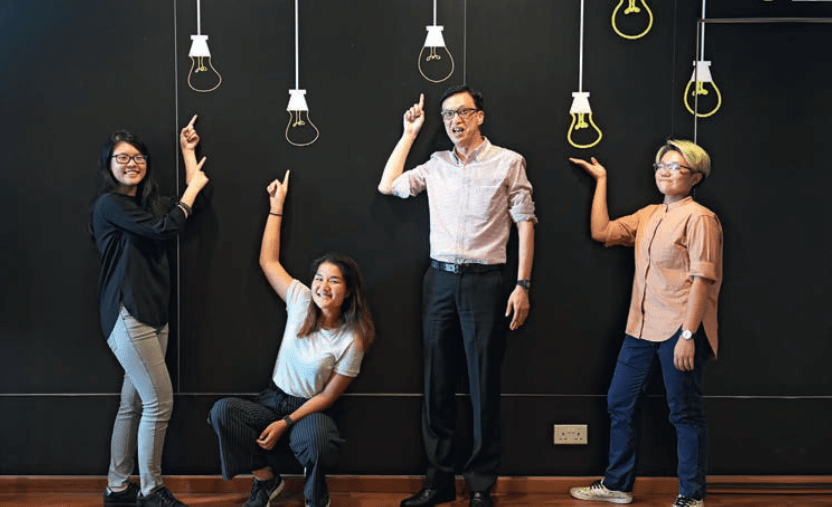
Etch Empathy was established by Aaron Yeoh (third from left) to create an empathy-driven environment for disabled and financially inadequate individuals through engaging activities.
unning a social enterprise is not easy, and neither is it the best way to become affluent in life.
Aaron Yeoh knows this all too well. After all, he runs not one but two social enterprises. “There have been several instances when I considered switching to a betterpaying career that would afford my family a better life,” muses the 43-year-old, who is married with two children.
“The problem is that every time another career opportunity presents itself, I get a glimpse of the light at the end of the tunnel. The next thing I know, I’m back hanging onto the belief that this would all work out!”
The toughest part about running two social enterprises, however, has little to do with balancing the books.
Yeoh instead cites the struggle to find the right partners. “It is usually a case of the other party not willing to sacrifice time and money. The thing about running a social enterprise is that you need to have a certain appetite for risk,” he says.
THE BIG SWITCH
Life used to be much rosier and less risky for Yeoh, who was formerly a financial advisor. But questions about the nature of his industry started to surface as millions of people around the world were plunged into poverty during the 2008 financial crisis.
“THE GOAL IS TO MAKE THE TECHNOLOGY [OF COOKING DEVICES THAT PROCESS VERBAL COMMANDS] OPEN SOURCE SO THAT VISUALLY IMPAIRED PEOPLE ANYWHERE IN THE WORLD CAN USE IT SOMEDAY. THIS WILL HELP TO BRING DOWN THE MANUFACTURING COST OF SUCH DEVICES.”
“I thought I was supposed to help people. But all I saw were people losing money. As I dwelt deeper, I came to the realisation that this world is set up in a way that the rich gets richer while the poor gets poorer,” he recalls. This incident also struck a chord because he is no stranger to poverty.
When he was in primary school, his parents went bankrupt after the family’s motorcycle business failed. To make ends meet, his father resorted to taking on odd jobs in the day and driving a taxi at night. When his peers hit the cinemas and amusement arcades during the holidays, Yeoh spent his days working part-time at McDonald’s and hotel banquets. For years, the family lived hand-to-mouth.
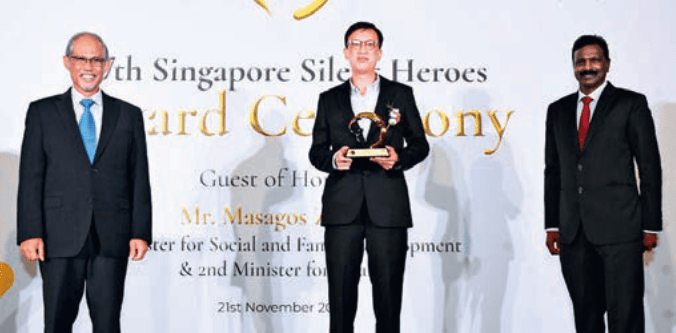
Yeoh (centre) is one of the recipients of the 2020 Singapore Silent Heroes Award for his contribution to community through three social enterprises.
The indelible mark that the financial crisis left on him grew as the days went by, and it eventually drove him to begin volunteering. In 2009, he led a team of students to Cambodia to build roads and sanitation systems.
In 2013, he sacrificed his stable and comfortable income as a financial advisor to follow a calling that had only grown louder over the years – to help those less fortunate than him. He set up Etch Empathy, a social enterprise that, as its name suggests, conducts workshops where people get to empathise with the challenges faced by disabled and poverty-stricken individuals through various activities.
The enterprise also provides corporate social responsibility opportunities for companies, skills development for the visually impaired and leadership training for youths. Four years later, he expanded his do-gooder portfolio by taking over the Singapore chapter of Cycling Without Age, a social initiative that aims to evoke more empathy in society and empower senior citizens through free trishaw rides.
GROWING HIS APPETITE
But he didn’t stop there. That same year, Yeoh set up Fortitude Culina, a social enterprise that made the intrepid foray into an uncharted territory: providing culinary training for the visually impaired.
The enterprise generates income by conducting mobile cooking programmes and taking its blind chefs to the pantries of corporations to whip up scrumptious meals while raising awareness about inclusivity.
While he admits that running two social enterprises is not a walk in the park, Yeoh did receive support in the form of the Young Social Entrepreneurs (YSE) Global programme. Organised by the Singapore International Foundation (SIF), the YSE is an eight-month programme that helps people from around the world start or expand their social enterprises.
Participating in the YSE back in 2014, says Yeoh, taught him that social enterprises need to be focused on three key aspects: the inclusive hiring, caring for the planet and generating profits.
“The profit aspect was a good reminder that I needed to view the business as a competitor to other entities and not merely as a means to provide employment for visually impaired chefs,” he says.
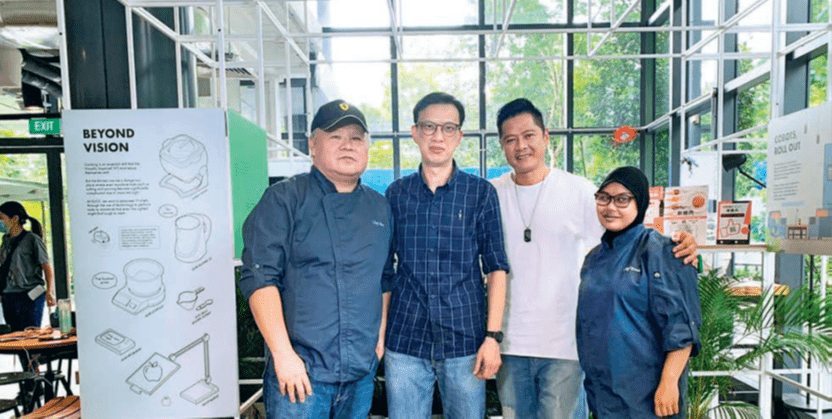
Yeoh started social enterprise Fortitude Culina to provide culinary training to visually impaired people and empower them through cooking skills.
“Take Fortitude Culina, for example. At the end of the day, customers would come for the food and not merely to support the chefs. If the food isn’t good and the service unsatisfactory, customers will probably come only a couple of times to support the social cause and never return again.”
In September 2019, Yeoh held the soft launch for Fortitude Culina’s café space, but the official launch was scuppered by Covid-19. Ever the optimist, he saw a silver lining. “The pandemic gave us a chance to really prepare for the official launch later this year. We have been using the past few months to analyse the market, perform stress tests and ensure that our food is of a high quality,” he says.
“GIVEN OUR DIGITALISED AND FAST PACE OF LIFE IN SINGAPORE, MANY OF US WOULD PREFER TO CONNECT DIGITALLY RATHER THAN IN PERSON. THIS CONTRIBUTES TO A LOSS IN INTERPERSONAL SKILLS, AND WE END UP TAKING PEOPLE FOR GRANTED,” SAYS AARON YEOH.
“This is very important because what we are doing is unique. There is no other model in the world that we can take a reference from.”
To help his chefs overcome the challenges posed by their disability, he has procured cooking utensils that come with braille markings and assistive devices such as talking induction cookers. But what is even more remarkable is the partnership he struck up with Ngee Ann Polytechnic and Nanyang Technological University to develop cooking devices that can process verbal commands.
“The goal is to make the technology open source so that visually impaired people anywhere in the world can use it someday,” he says. “This will help to bring down the manufacturing cost of such devices, which would subsequently raise adoption rates. And when you have high adoption rates, this is when you truly achieve inclusivity.”
His valiant efforts have not gone unnoticed. In 2020, Yeoh was named the winner of the Hearts for Humanity category at the Singapore Silent Heroes Award. In 2021, he was conferred a S$5,000 grant from the Citizen Ambassador (CA) Development Fund by the SIF. The fund helps CAs share the social impact of an SIF programme and how it has fostered greater understanding among communities. Past initiatives that have been supported include exhibitions, research projects, publications, conference presentations and other collaborations. The grant has already been used to fund some of the assets required to launch another heartwarming initiative of his – a programme where patrons dine in the dark with visually impaired people.
Unlike similar programmes where diners are merely served by visually impaired staff in a dark setting, the one run by him goes a step further by allowing guests to dine with the visually impaired guides, and share intimate conversations that help foster greater awareness about the visually impaired community. The initiative also features a live music performance by the visually impaired that highlights the fact that these individuals should not be defined by their disability, and that they are also as artistically talented as able-bodied people.
He says he hopes to forge new friendships and raise awareness about the visually impaired community through this programme.
THE PATH TO EMPATHY
While Yeoh does not think that Singaporeans are typically apathetic, he suggests that the nation’s economic miracle might have inadvertently created Singapore’s notorious kiasu (afraid to lose) mentality, which in turn hinders empathy.
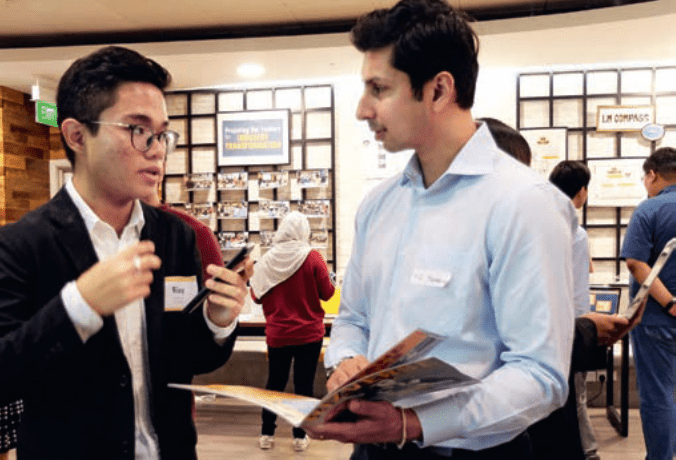
Siddharth Pisharody (right) speaking to young graduates from Hatch’s training programme. Hatch is a social enterprise that Pisharody mentored for the YSE 2019 edition.
“When the focus is on economic growth at all costs, certain things like social and emotional capital end up being sacrificed,” he says. He believes that the key to fostering a more empathetic society lies in education, but his proposed approach is much bolder than simply introducing classes that teach the importance of empathy.
“We need to change the education system – we need to teach by ability, not by age,” he says. “Just because a child is 14 doesn’t necessarily mean that he or she should be in Secondary 2. Everyone has a different capacity for learning. The current one-sizefits- all approach needs to change because it doesn’t recognise that everyone is unique.”
He also suggests that encouraging more interpersonal relations could help to foster greater empathy. “Given our digitalised and fast pace of life, in Singapore, many of us would prefer to connect digitally rather than in person. This contributes to a loss in interpersonal skills, and we end up taking people for granted,” he says. “I used to see my parents only once or twice a week. The pandemic pushed me to slow things down and communicate with them more often. Our relationship is now closer than ever.”
CONSCIOUS ACT OF GIVING
Among the SIF’s volunteers are also members of the international community – Friends of Singapore – who enable the organisation’s work of building stronger relations between Singaporeans and world communities. Siddharth Pisharody, a volunteer at the SIF, and the 2021 recipient of the Silent Heroes Award in the Compassionate Foreigner category, is one of them.
Over the past seven years, he has mentored social enterprises that are backed by the SIF’s YSE Global programme, utilising his rich corporate experience to dispense invaluable advice on how these fledgling companies can refine their do-good ideas and scale their operations.
INVESTING IN SOLUTIONS
But it is not just the enterprises that Pisharody has taken under his wing that have benefitted from this relationship. He himself has also made gains – in the form of a career epiphany. A few months ago, Pisharody left his role at Temasek International, where he was the director of investments, to become a venture capitalist.
The reason? He was so inspired by the resolve and ideas of the social enterprises he has mentored that he wanted to be able to back such companies financially.
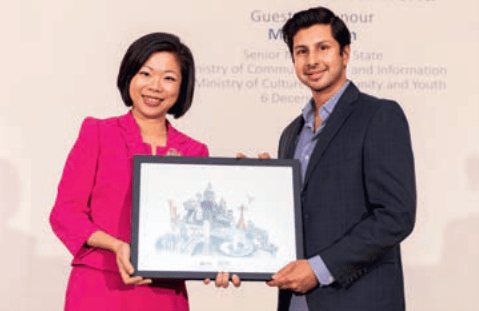
Pisharody receiving the Friend of Singapore — Gotong Royong Award – from Senior Minister of State Ms Sim Ann at the SIF ShiOK! Nite event in 2019.
“When I was preparing for a pitch and was unsure of the financial projections that I was making, it was at that moment that Siddarth told us he believes in our team and truly thinks that we can achieve those projections.”
Victor Zhu, founder and CEO, Hatch
“The experience of mentoring these social enterprises has allowed me to see the amount of innovation that is taking place, and the plethora of problems that still needs to be solved – and funding can be one of the challenges in this endeavour. This has further inspired my career move into venture capital,” he explains.
“I haven’t thought about being a social entrepreneur myself. Currently, I intend to dedicate all my energy to helping earlystage enterprises, and I would attribute part of this decision to the positive experience I have had as part of the YSE programme.”
One of the key reasons why he signed up as an SIF volunteer, he recalls, was being inspired by Society Staples, a start-up that was on the 2014 list of social enterprises supported by the YSE programme.
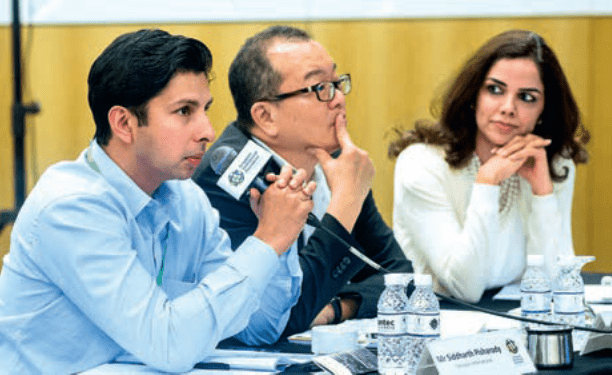
The 2020 Singapore Silent Heroes Award winner, Pisharody (left) is seen here as part of the panel of judges at the YSE 2017 Workshop’s business presentations.
Having grown up with an uncle who suffers from a mental disability, this initiative particularly resonated with Pisharody as Society Staples was planning to build Singapore’s first inclusive gymnasium for people with disabilities. “I thought that this was an amazing concept because my uncle is schizophrenic and nobody ever thinks about catering to the exercise needs of such individuals,” he says.
With the help of Pisharody, who was then a management consultant at Mckinsey & Company, Society Staples went on to win the President’s Challenge Social Enterprise Award – Start-Up of The Year in 2015.
Another Singapore-based social enterprise whose founders Pisharody mentored was Hatch. The company works with organisations such as the Ministry of Social and Family Development and YMCA to provide training to youths who did not manage to complete the traditional education route and, hence, lacked the paper qualifications needed to secure a good career.
To Victor Zhu, the founder and CEO of Hatch, one of the biggest gifts that Pisharody gave as a mentor was his invigorating vote of confidence. “I remember an instance when I was preparing for a pitch and was unsure of the financial projections that I was making. While they were based on sound parameters, the future revenue numbers were quite a significant jump from where we were,” recalls Zhu.
“It was at that moment that Siddarth told us that he believes in our team and truly thinks that we can achieve those projections. I won’t forget the confidence and support he has provided to our team.”
THE VALUE PROPOSITION
Apart from being a mentor, Pisharody also contributed to the YSE programme by being the liaison between the SIF and Temasek International – the latter is key to providing skilled volunteer mentors.
Social enterprises, he notes, are an important part of the business landscape today, not simply because they help level the playing field in society but also because they act as a reminder of what businesses of today need to be.
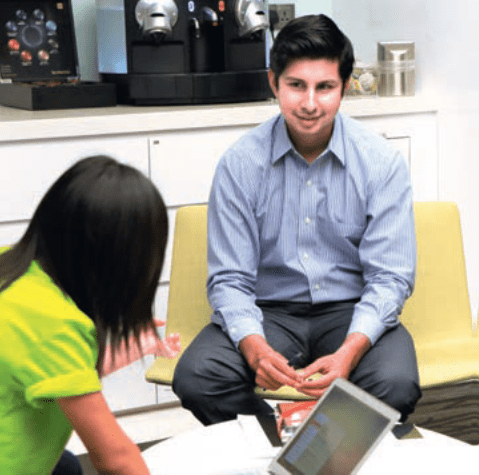
Pisharody, a longtime YSE mentor, is seen here consulting with his assigned YSE team from Singapore in 2014.
“Many people used to say that the objective of a company is to maximise shareholder value. However, now it is not just about maximising shareholder value but also maximising value for the community. This will ultimately differentiate a successful company from one that is not conscious of environmental, social and [corporate] governance,” he says.
“In Southeast Asia, we are beginning to see this interesting trend, where companies that are socially responsible but aren’t necessarily social enterprises are being seen as valuable entities.”
But this trend, he adds, is still in its nascent stages, and more support in three key areas will be needed to spur greater progress — more capital from investors, more support from established companies to help social enterprises scale, and ensuring that these community-focused start-ups have the talent required to grow their business.
The road to success also depends on how aspiring social entrepreneurs design their business. “Often I find that these young entrepreneurs are very passionate about an idea, but they don’t think hard enough about how they can grow it into something bigger and sustainable,” he says.
Which isn’t to say that being overly passionate is a shortcoming. In fact, Pisharody says that passion is a social enterprise’s biggest enabler.
“To these youths, no mountain is too high to climb, and every problem can be solved. There is a beauty in the innocence of youth,” he says.
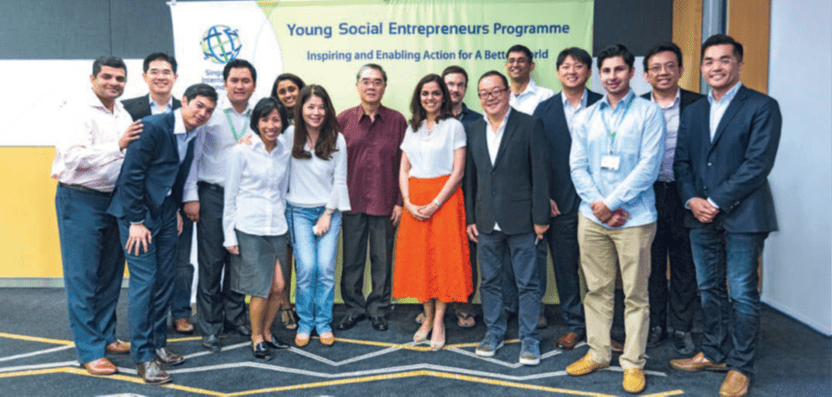
A group photo of judges at the YSE Workshop’s business presentation in March 2017.
|
CITIZEN AMBASSADOR The work of the Singapore International Foundation (SIF) is not possible without the support of many Singaporeans who generously give of their time and talent. Their collective efforts bring us closer to becoming a nation of responsible global citizens. Singaporeans play the role of Citizen Ambassadors (CA) when they volunteer to work alongside their overseas counterparts to shape new realities, while fostering greater intercultural understanding. A CA is a friend of the world – someone who recognises that Singapore sits within the global community and that there is a need for greater understanding between countries in order to build a better, more peaceful and inclusive world.
As key enablers of our work, all our CAs abide by the SIF Global Citizens Charter, which sets out the principles, values and behaviours expected of them, based on the SIF’s mission and core values. 
Scan here to find
|
